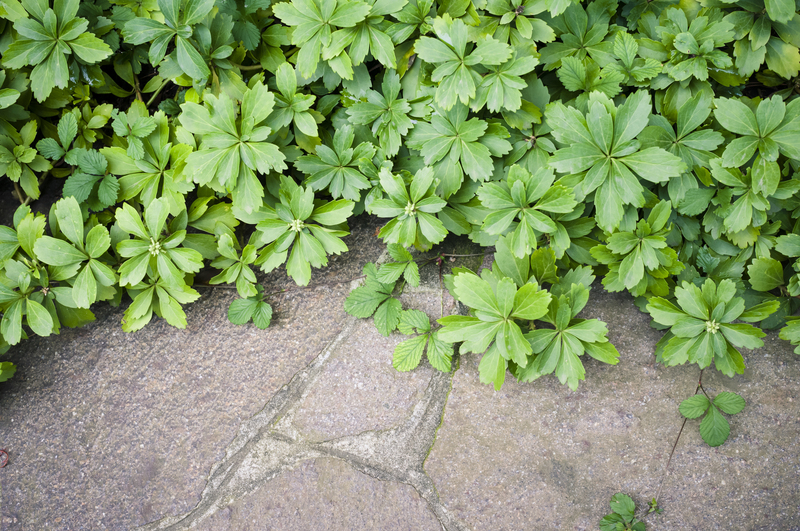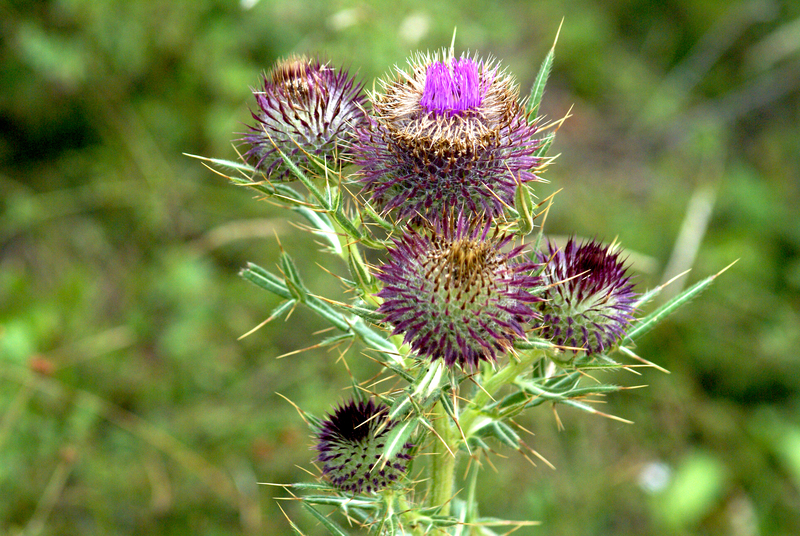From Trash to Treasure: Organic Waste Becomes Rich Soil
Posted on 19/09/2025
From Trash to Treasure: How Organic Waste Turns into Rich, Fertile Soil
In our modern society, the problem of waste management has escalated, with organic waste making up a significant portion of household and industrial garbage. But what if there was a way to transform this so-called "trash" into a valuable resource? From trash to treasure: Organic waste can be converted into nutrient-rich soil, promoting sustainable gardening and agriculture while dramatically reducing landfill contributions. In this article, we'll explore the fascinating journey of organic waste from kitchen scraps to fertile soil, the science behind composting, environmental benefits, practical steps for home composting, and the latest innovations turning waste into wealth.

What Is Organic Waste?
Organic waste refers to any biodegradable material originating from plants or animals. Common examples include food scraps, fruit and vegetable peels, coffee grounds, eggshells, yard trimmings, leaves, and even paper products. Globally, organic waste accounts for a large share of total waste, estimated at up to 50% in some communities. Unfortunately, this valuable resource often ends up in landfills, where it breaks down anaerobically, generating methane--a potent greenhouse gas.
Types of Organic Waste
- Food scraps: Leftovers, fruit and vegetable peels, grains, and dairy (in moderation)
- Yard waste: Grass clippings, leaves, branches, and weeds
- Paper products: Napkins, paper towels, uncoated paper plates, and coffee filters
- Other biodegradable materials: Hair, nail clippings, and pet fur (in small amounts)
The Science of Transformation: Composting Explained
The transformation of organic waste into rich soil is predominantly achieved through composting, a natural process where microorganisms, such as bacteria and fungi, break down organic matter. Proper composting converts smelly, unwanted waste into a nutrient-dense humus that improves soil health and plant growth.
Composting Process: Step by Step
- Collection: Gather organic materials such as kitchen scraps and yard trimmings.
- Layering: Alternate between "green" nitrogen-rich material (fruit peels, grass) and "brown" carbon-rich material (dry leaves, cardboard).
- Moisture: Maintain a damp, not soggy, environment to support microbial activity.
- Aeration: Regularly turn the pile to provide oxygen for aerobic decomposition.
- Maturation: Allow the mixture to break down over weeks or months, forming dark, crumbly, earthy-smelling soil.
The Role of Microorganisms and Invertebrates
The magic behind turning trash into treasure lies with tiny organisms. As bacteria, fungi, and actinomycetes feast on the organic material, they generate heat--accelerating decomposition. In larger compost systems, earthworms, beetles, and other invertebrates further break down material, enriching the final compost.
From Trash to Treasure: The Benefits of Composting Organic Waste
Environmental Impact
- Reduces landfill waste: Diverting organic waste from landfills lessens the pressure on waste management infrastructure.
- Decreases greenhouse gases: Composting cuts methane production, mitigating climate change effects.
- Replenishes soil nutrients: Returning nutrients to the earth supports soil fertility and ecosystem balance.
- Conserves water: Rich soil increases moisture retention and reduces the need for frequent watering.
- Suppresses plant diseases: Healthy compost boosts beneficial microorganisms, helping to protect plants naturally.
Economic and Social Advantages
- Reduces fertilizer costs: Organic compost substitutes for expensive synthetic fertilizers, saving money.
- Creates local jobs: Community composting initiatives and organic waste management generate employment opportunities.
- Promotes food security: By improving crop yields and soil health, composted soil supports local food production.
- Fosters community engagement: Garden projects and composting workshops educate and unite neighborhoods.
How to Compost at Home: Turning Waste to Wealth in Your Backyard
Home composting is a simple, effective way to transform waste into valuable soil. Anyone with a small yard, garden, or even a balcony can get started with minimal effort and investment. Here's your step-by-step guide:
1. Choose Your Composting Method
- Traditional compost pile or bin: The most common option, suitable for most homes and gardens. Compost bins keep the process tidy and protected.
- Vermicomposting: Using worms (typically red wigglers) to accelerate decomposition. Ideal for indoor use or small spaces.
- Bokashi method: An anaerobic process using special bran to ferment organic waste. Great for apartments or those wanting to compost meat and dairy.
2. What Can and Can't Be Composted
- Compostable items: Fruit and vegetable scraps, coffee grounds, tea bags, eggshells, bread, plain rice, grass clippings, dry leaves, newspaper, non-glossy cardboard.
- Avoid: Meat, fish, dairy (except in bokashi), oils, diseased plants, glossy paper, synthetic materials, and pet waste.
3. Maintaining Your Compost Pile
- Balance "greens" and "browns": Too many greens (nitrogen) cause odor; too many browns (carbon) slow down decomposition.
- Troubleshooting: If compost smells bad, add more browns and turn the pile for aeration. If it's too dry, sprinkle with water.
- Harvest: Depending on conditions, mature compost appears after 2-6 months, ready to be mixed into soil or spread as mulch.
Sustainable Agriculture and Circular Economy: Beyond Home Composting
The principles of transforming organic waste into rich soil are being adopted far beyond residential gardens. Across the world, municipalities, farms, and businesses are embracing large-scale organic waste recycling and industrial composting for sustainable agriculture and waste management. This shift is crucial for building resilient food systems and achieving environmental goals.
Industrial and Municipal Composting
- Curbside composting programs: Cities collect organic waste separately from households and process it in vast composting facilities.
- Agricultural recycling: Farmers use crop residues and manure to create compost, enriching fields and reducing chemical use.
- Compost for landscaping: Cities and businesses use composted organic material for parks, highways, and green spaces.
- Bioenergy generation: Some facilities convert organic waste into biogas, providing renewable energy and digestate, a fertilizer byproduct.
Key Benefits for Sustainable Development
- Reduces landfill dependence: Less waste means fewer landfills and a cleaner environment.
- Improves soil quality: Larger-scale application of compost restores degraded soils, enhances structure and fertility, and promotes drought resilience.
- Supports local economies: Creating markets for compost and organic soil amendments boosts green business growth.
- Community empowerment: Social enterprises and school programs educate the next generation about sustainable food cycles.
Innovations in Organic Waste Management: New Technologies Turning Trash into Treasure
As interest grows in sustainable living, innovative methods for turning organic refuse into valuable soil are emerging. Technology is making the process faster, more efficient, and accessible at every scale--from individual households to global agribusiness.
Smart Composters and IoT Solutions
- Automated home composters: Countertop devices use controlled heat, aeration, and chopping to turn kitchen scraps into usable soil in mere hours.
- Sensor-equipped compost bins: IoT sensors track temperature, moisture, and oxygen, sending alerts to users for optimal conditions.
- Mobile apps: Helpful reminders and composting tips sent straight to your phone, making it easier than ever to reduce organic waste.
Biotechnological Advances
- Specialized microbes: Engineered bacteria accelerate breakdown of tough materials like lignin in woody waste.
- Black soldier fly larvae: Farms use insects to rapidly consume organic waste, converting it into protein animal feed and rich frass (waste) fertilizer.
- Biochar production: Pyrolyzing organic waste locks carbon away and creates a long-lasting soil amendment.
Tips for Successful Composting and Organic Waste Reduction
Get the Most from Your Waste
- Chop scraps smaller: Smaller pieces decompose faster.
- Mix regularly: Turning your compost every 1-2 weeks speeds up the process.
- Location matters: Place your bin in partial shade and on well-draining ground to maintain temperature and moisture.
- Share surplus: If you make more compost than you need, donate to local gardens or neighbors.
Other Ways to Reduce Organic Waste
- Meal planning: Reduces food waste by buying and prepping only what you'll use.
- Creative cooking: Use vegetable peels for broths, leftover bread for croutons, and fruit rinds for homemade cleaners or zest.
- Donate leftovers: Community fridges and food banks can accept unused food before it spoils.
- Grow your own: Use your compost to start a vegetable garden, closing the loop in your household waste cycle.

Common Composting Mistakes and How to Avoid Them
- Ignoring balance: Too much nitrogen-rich material (greens) vs. dry carbon-rich (browns) leads to a slimy, smelly pile. Solution: Evenly layer both types.
- Neglecting aeration: Compact compost piles lack oxygen, slowing the process and causing odor. Solution: Turn your compost regularly.
- Adding the wrong materials: Include only approved organic matter. Avoid meat, dairy (unless bokashi), and synthetic items.
- Letting it dry out: Compost needs moisture. If neglected, sprinkle with water as needed.
- Expecting instant results: Good composting takes time--anywhere from two to six months depending on method and climate.
Conclusion: Embracing the Journey from Waste to Wealth
The transformation of organic waste into fertile soil is much more than a gardening project; it's a profound step toward sustainability, closing the nutrient loop, and protecting our planet for generations to come. By composting at home or participating in community programs, each of us has the power to convert everyday trash into a vital resource--empowering healthier soils, stronger communities, and a cleaner environment.
*Ready to start your own "from trash to treasure" journey? Set up a compost bin, join a local program, or advocate for municipal composting. With simple action, we can all help turn waste into wealth--one banana peel at a time.*

